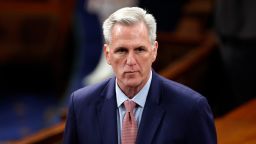As House GOP Leader Kevin McCarthy has struggled to lock down the votes to become speaker, his top deputy has kept his head down.
Rep. Steve Scalise, the No. 2 in the House GOP leadership, has made clear he supports McCarthy, and GOP sources say he has rejected pleas by hardliners to mount a challenge to the California Republican – all while taking steps to avoid being seen as plotting McCarthy’s demise.
But what is less clear: What Scalise will do if the race continues to drag out on Tuesday and goes to multiple ballots – and whether the Louisiana Republican will seek to maneuver his way into the speaker’s office if the stalemate persists. If McCarthy drops out of the race, Scalise is widely expected to run for the job, though sources close to the GOP leader say he plans to stay in the race as long as it takes to get the votes.
Yet another complicating factor: It is far from clear whether Scalise himself could get the 218 votes to win the speakership, underscoring the prospects that Tuesday could devolve into a long and drawn-out floor fight the chamber has not experienced in 100 years and one that could undercut Republicans’ ability to govern just as they come into power in the 118th Congress.
“Steve is trying to be very supportive,” said Rep. Don Bacon, a McCarthy supporter and Nebraska Republican. “He has been public that he is supporting McCarthy. I think someday he wants to be speaker so he’s got to be tactful.”
But leaving McCarthy’s office on Monday night, Bacon said he couldn’t support Scalise if he emerged as a candidate.
“I like Steve, so this isn’t about Steve,” Bacon said. “This is about five or six people taking hostages and us caving to them.”
Others privately fault Scalise for not being more forceful in his support for McCarthy or insisting he would stick with the California Republican no matter how long it takes. And some Republican members say that will only hurt Scalise if he tries to become speaker now.
“I think Steve Scalise is going to have some problems,” one GOP member told CNN on Monday, adding: “If Kevin McCarthy doesn’t become speaker, then Steve Scalise has faint fingerprints on the dagger.”
In a brief interview last month, Scalise said he wasn’t going to discuss speculation on what he might do if McCarthy doesn’t get the votes to become speaker.
“Obviously our focus is on getting it resolved by January 3,” he told CNN. “And there’s a lot of conversations that everybody has been having, Kevin, surely, with the members who have expressed concerns.”
Sources close to Scalise insist that the Louisiana Republican has not been taking steps to run for speaker and is not trying to hurt McCarthy’s bid in any way.
Other dark-horse candidates could emerge if McCarthy drops out, according to Republican lawmakers. Among the names that have been floated: North Carolina Rep. Patrick McHenry, a McCarthy ally who is poised to chair a top committee next year; Ohio Rep. Jim Jordan, a co-founder of the far-right House Freedom Caucus; and Oklahoma Rep. Tom Cole, a veteran lawmaker who would be seen as more of a temporary caretaker for the job. None of those lawmakers, however, have expressed any interest in the job, and they would almost certainly run into the same dilemma as McCarthy: Preventing more than four Republicans from defecting in a bid to win the speaker’s gavel.
Yet Scalise is seen as the most likely alternative if McCarthy falters.
One senior GOP source says that Scalise can’t be seen by his colleagues as making moves to run for the powerful position, knowing full well that doing so could hurt his ability to get the votes if McCarthy ultimately falters. Yet the same source predicted that Scalise would have an easier time winning over the right-wing of the conference given that he is seen as more ideological than McCarthy.
But Scalise also has drawn some skepticism from the more moderate wing of the conference, including many who plan to stick with McCarthy and credit him and his fundraising prowess for powering them back to the majority for the first time in five years.
In a private House GOP call on Sunday, Scalise embraced his role as the incoming majority leader by laying out the agenda and the bills that would come to the floor this week – and even referenced McCarthy as the future speaker, according to a source on the call.
Behind the scenes, however, Scalise has been approached by some members suggesting that he remain prepared to lead the conference if McCarthy bows out.
Some, however, don’t want to concede to the far-right flank by backing a separate candidate for speaker, even if they may like Scalise.
“There is no reason not to vote for Steve. It is not about whether Steve is better than Kevin. It is about how are you going to run the 118th Congress if you give the gavel to Scalise and give these guys a win?” one Republican member lamented. “Steve Scalise isn’t going to have any more fun than Kevin McCarthy.”
McCarthy has already made many concessions to weaken the power of the speakership and empower the rank-and-file through a rules package that would change the way the House operates – a move to cater to the hardliners who have demanded more say in the new Congress. In one key concession, he has agreed to significantly lower the threshold to now allow a bloc of just five members to call for a vote seeking the ouster of a sitting speaker.
But some of the hardliners are not satisfied, pushing to lower the threshold to just a single member who can call for such a vote – something that other House Republicans fear would be a recipe for chaos and have vowed they wouldn’t support.
“It will come to a head tomorrow,” said one GOP source with knowledge of the talks on Monday, while adding: “All roads lead back to Kevin.”
Yet the concessions package that McCarthy has negotiated – which have been rolled into a rules proposal that needs to be adopted by the full House after the speaker’s vote – could very well fail to win the 218 votes necessary for approval if there’s another candidate for speaker. Some say they would only vote for such a deal if McCarthy is the next speaker. If another candidate emerges, they say, those concessions won’t be adopted.
“I think people will become more set against rule and operational changes if it becomes clear that no matter what, KMC won’t get their votes,” said another GOP member, referring to McCarthy.
Yet the GOP hardliners say the next candidate must agree to the same set of demands.
Indeed, asked if Scalise would need to agree to the same concessions as McCarthy, Florida Rep. Matt Gaetz told CNN: “Of course. The McCarthy concessions are a baseline for anyone.”
If McCarthy can’t win 218 votes, the hard-liners have suggested a new candidate would emerge but they have steadfastly refused to name the individual – something that is infuriating many McCarthy allies in the conference.
Rep. Bob Good, a Virginia Republican and “hard no” on McCarthy, told CNN on Monday there are 10-15 Republicans he expects to vote against the GOP leader on Tuesday. He said that even if McCarthy gave into the demands they’ve made to make it easier to oust a sitting speaker, he said that wouldn’t be enough to win. He said that McCarthy is in a “desperate place” to become speaker and suggested his word couldn’t be trusted as he makes promises in the eleventh hour.
“We shouldn’t be in a hurry to make a bad decision,” Good said, promising a new candidate would emerge on Tuesday. He declined to specify the member and also declined to comment about Scalise.
“I’ll resist for just a few more hours what I’ve resisted for a few weeks, which is to comment on specific candidates,” Good said. “Kevin McCarthy is part of the problem.”
‘Chaos agents’: Tensions boil over in conference
The posturing has enraged many McCarthy allies.
Rep. Dusty Johnson, a South Dakota Republican, said that he found it “incredible” that the same members pushing for a more “open and transparent” GOP conference are getting behind a “shadow candidate” they plan to “ambush” Republicans with at the start of the new Congress.
“I think members are growing increasingly frustrated with the intransigence of some of the holdouts,” Johnson told CNN, calling some of them “chaos agents who are trying to cause trouble.”
The assessment is even blunter privately.
“Folks should not believe this is some noble cause,” said one GOP lawmaker. “No one should believe that this is anything other than self aggrandizement. They are trying to push procedures that no one cares about outside of Washington only to give themselves more power.”
“If they were demanding some policy change it would be one thing, they’re not,” the source said. “They’re demanding notoriety.”
How Tuesday will go remains anyone’s guess. McCarthy already has one GOP challenger in the race – conservative Rep. Andy Biggs of Arizona – whose candidacy almost guarantees that he will siphon away enough GOP votes to deny the California Republican a majority of the House.
The House could go into recess to allow for Republicans to privately meet, but 218 votes would be needed to cause a break in the floor action on Tuesday. Or the House could continue to vote until someone gets to 218 – a scenario that hasn’t happened since 1923 when Frederick Gillet won the speakership on the ninth ballot. A source familiar with the matter said that the chamber has no plans to recess and will continue to vote until McCarthy wins 218 votes.
To prevent a day of chaos, McCarthy continued to work the phones on Monday in the speaker’s office that he hopes to officially move into on Tuesday.
Sen.-elect Markwayne Mullin, an Oklahoma Republican and outgoing House member, met with McCarthy in his office on Monday. Mullin, who has been helping to lobby House members to back McCarthy, said he and others have been encouraging McCarthy with a simple message: “Stay put.”
When asked about Scalise, Mullin told CNN: “I don’t think Scalise can get to 218.”
CNN’s Dana Bash and Morgan Rimmer contributed to this report.









